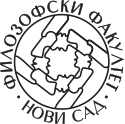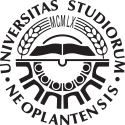15FLFL010 - Theory of Cognition
| Course specification | ||||
|---|---|---|---|---|
| Course title | Theory of Cognition | |||
| Acronym | 15FLFL010 | |||
| Study programme | Philosophy | |||
| Module | ||||
| Type of study | first degree undergraduate academic studies | |||
| Lecturer (for classes) | ||||
| Lecturer/Associate (for practice) | ||||
| Lecturer/Associate (for OTC) | ||||
| ESPB | 6.0 | Status | ||
| Condition | No additional requirements. | Oblik uslovljenosti | ||
| The goal | Acquainting students with the basis of human knowledge reconstruction, genesis of human knowledge and its conceptuality, familiarizing students with the different methodical approaches concerning the problem of knowledge, and with gnoseological positions of classical and modern authors. | |||
| The outcome | Acquiring the basic methodological and terminological competence needed for handling classical and modern problems concerning the emergence, verification and conceptualization of knowledge. | |||
| Contents | ||||
| Contents of lectures | Concept and types of knowledge. Structure of knowledge (subject and object of knowledge). Forms of knowledge. Origins of knowledge (senses, reason, intellect). Potentiality and limitations of knowledge. Concepts of consciousness and unconsciousness. Idea taken as a gnoseological term. Knowledge and language. Sensations taken as cognitive conditions. The gnoseological modell of synaesthesia. Concept of cognitive values. Notion and theories of truth. Classical positions: Idealism, Skepticism, Rationalism, Empiricism, Criticism. Contemporary positions: Positivism, Neo-Kantianism, Phenomenology, Naturalism, Analytic philosophy. | |||
| Contents of exercises | Text analysis and intensive discussion of classical and modern theoreticians of knowledge, for the purpose of gaining basic gnoseological competences which will serve as a preparation for the written and oral exam. | |||
| Literature | ||||
| ||||
| Number of hours per week during the semester/trimester/year | ||||
| Lectures | Exercises | OTC | Study and Research | Other classes |
| 2 | 2 | |||
| Methods of teaching | Dialogical method, analysis of original texts | |||
| Knowledge score (maximum points 100) | ||||
| Pre obligations | Points | Final exam | Points | |
| Activites during lectures | 15 | Test paper | ||
| Practical lessons | 20 | Oral examination | 50 | |
| Projects | ||||
| Colloquia | 15 | |||
| Seminars | ||||

